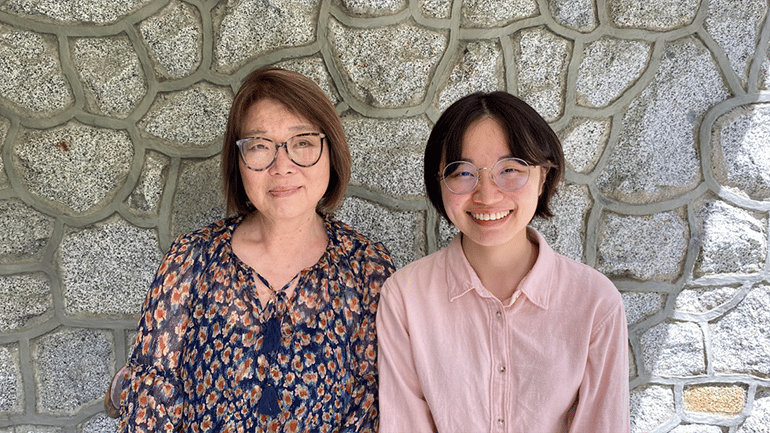
Left to right: Dr. Grace Park, Fraser Health’s clinical research lead for Geroscience and Frailty, and Margaret Lin, registered nurse and regional project lead, Home and Community Health, Fraser Health Photo: Fraser Health
This story first appeared in the ______ edition of the Fraser Valley Current newsletter. Subscribe for free to get Fraser Valley news in your email every weekday morning.
Fraser Health has received two Michael Smith Health Research BC grants of $125,000 to expand its social prescribing program. The new grants will allow more seniors to have access to the program, which connects them to services such as exercise and social activities, and supports healthy nutrition.
The program started in 2019, and by 2020, it had 126 service centres serving more than 2,000 seniors in 15 communities. Fraser Health offers social prescribing in Abbotsford, Agassiz, Chilliwack, Langley, Maple Ridge, and Mission in the Fraser Valley.
“Health is more than just medical concerns, that environmentally and socially, there are issues that can interfere with an older adult from aging, well, aging in place and living a high quality of life,” said Grace Park, physician and clinical research lead, Geroscience and Frailty, Fraser Health.
Patients can access social prescribing services either with the help of their family doctor or by self-referring. Health care providers can refer a patient to a community connector, a staff member in the community who can refer the patient to the services they need. The program is provided in collaboration with United Way British Columbia, which is funded through the Ministry of Health.
“We had two developmental proposals approved by the Michael Smith Foundation. So together, we have about $125,000 over a period of six months to develop the infrastructure for a final implementation grant application, and that application is due October 7,” Park said. “With the new grant, if we’re successful, we will have added funding of something like $1.3 million, maybe even a bit more.”
Social prescribing aims to address health holistically and address concerns such as social isolation, fitness and wellness, healthy nutrition, transportation, and other concerns for seniors who are mostly independent but would still benefit from these services. Park gave examples of walking clubs, social clubs, food banks, food delivery services, and transportation to and from their destinations.
“Social isolation is a big issue that we deal with in social prescribing, because we know that with limited finances or limited transportation or mobility, our older adults become isolated, which is a huge health risk in itself that leads to increased risks of dementia, depression, and other kinds of health concerns,” Park said. “I think it’s so important that we address the social factors and loneliness and isolation concerns, because they contribute directly to a person’s well being, their ability to self manage, their ability to stay in their own homes, delay a move to facility care if that was something that was going to come up for them, because without these supports, they will land up in hospital, they will land up in emergency, and may go into facility care.”
Park gave the example of a patient in his early 60s who had symptoms of depression and was referred to the social prescribing program by his primary care nurse practitioner. During the intake process, the community connector staff member asked questions about his life and discovered some of the patient’s concerns and stressors.
“This particular individual was concerned because his rent was going up, and he was renting a suite in a home, and soon he was no longer able to make the rent, and he was facing homelessness. This is something that did not come out in a health interaction,” Park said.
The community connector searched for options in the community and was able to assist the patient in accessing financial assistance for rent and finding a new place to live, but helping him went beyond addressing the economic realities of his situation.
“They talked about what else might make his life a little bit happier,” Park said. “He told the connector that he used to play a guitar, was a musician decades before, but hadn’t played for a long time. So between the patient or the older adult and the connector, they developed the local program in the community organization for all seniors to come together to play music, read poetry, and bring their art.”
The patient started facilitating the meetings, playing his guitar, and connecting with other seniors in his community, which helped improve his mood and reduce his depression.
“This is a non-medical approach to what was going on, and really it was a social situation that was leading to that condition,” Park said.
As the program expands, more seniors throughout British Columbia will have access to social prescribing. However, the program focuses primarily on seniors with no plans to expand it to other age groups.
“So far, we have Northern Health, so it will be all of the northern part of British Columbia, which is a huge geographical region. And we will have challenges, because many of the communities are very rural and remote, so they will have a different approach to social prescribing than what we did in Fraser Health,” Park said. “But we’ll be working with the local health authority leaders on how to do that best in partnership with United Way, because they’re the funding body, along with the community connectors in those small communities.”
